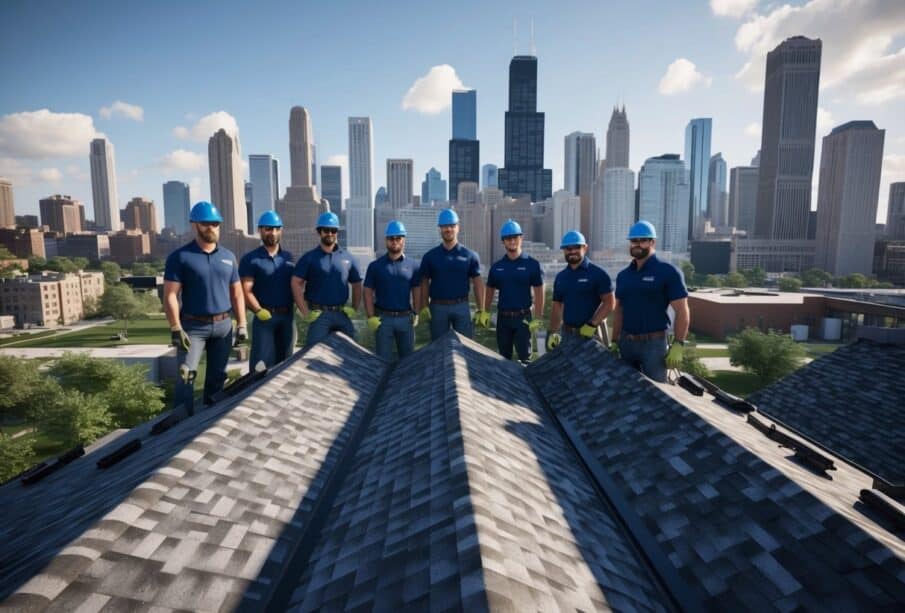How Chicago Roofing Companies Are Advancing Industry Standards: Innovative Techniques and Quality Improvements

Chicago roofing companies are setting new standards in the industry. They are pushing for better practices and higher quality work. This drive for improvement helps both roofers and building owners.
The Chicago Roofing Contractors Association (CRCA) leads efforts to advance roofing standards through education and advocacy. The group shares knowledge about new methods and materials. It also works to update local building codes.
Roofing firms in Chicago are using new tech to improve their work. They test innovative materials that can make roofs last longer. Some companies are also trying eco-friendly options. These changes aim to make roofs in Chicago stronger and more efficient.
Evolution of Chicago Roofing Standards
Chicago’s roofing standards have changed a lot over time. These changes aim to make buildings safer and more energy-efficient. They also reflect new materials and methods used in roofing.
Historical Context and Changes in Building Regulations
Chicago’s early building codes focused on fire safety after the Great Chicago Fire of 1871. As years passed, the codes grew to cover more areas. In 2001, Chicago made a big change. The city added rules for cool roofing to its building standards.
These rules help fight the urban heat island effect. They make buildings use less energy for cooling. The codes now include things like:
- Fire resistance ratings
- Wind uplift resistance
- Energy efficiency standards
- Green roof requirements
Influence of the International Building Code and Chicago City Council
The International Building Code (IBC) has shaped Chicago’s rules. But Chicago still keeps some of its own unique standards. The Chicago City Council often updates the city’s building code.
In recent years, they’ve made changes to:
- Align more closely with the IBC
- Improve energy efficiency
- Promote sustainable roofing practices
These updates help keep Chicago’s buildings modern and safe. They also make it easier for builders to work in different cities.
Roles of Building Code Officials and Specifiers
Building code officials play a key role in Chicago’s roofing standards. They:
- Interpret and enforce the codes
- Inspect buildings for compliance
- Provide guidance to contractors and building owners
Specifiers also have an important job. They choose materials and systems that meet code requirements. The Chicago Roofing Contractors Association (CRCA) helps keep these professionals up to date.
CRCA shares info about new codes and technologies. This helps ensure that Chicago’s roofs meet the highest standards.
Technological Advancements in Roofing
Roofing companies in Chicago are embracing cutting-edge innovations to improve efficiency and durability. New materials and technologies are transforming how roofs are built and maintained.
Innovations in Roofing Materials
New roofing materials are revolutionizing the industry. Cool roofs reflect more sunlight and absorb less heat, reducing energy costs. These use special reflective coatings or tiles.
Synthetic slate and shake roofing mimic natural materials but offer improved durability. They resist impact, fire, and weathering better than traditional options.
Self-healing materials can repair small cracks and holes automatically. This technology uses capsules filled with healing agents that activate when damage occurs.
Green roofing systems incorporate vegetation, improving insulation and managing stormwater. They also create habitats for wildlife in urban areas.
Emerging Roofing Technology
Drones are changing roof inspections. They capture detailed images and thermal scans, identifying issues quickly and safely.
3D modeling software allows precise measurements and designs. This improves accuracy in estimating materials and costs.
Solar roof tiles generate electricity while blending seamlessly with traditional roofing. They offer an aesthetically pleasing alternative to bulky solar panels.
Smart roof sensors monitor conditions in real-time. They can detect leaks, temperature changes, and structural issues before they become serious problems.
Role of Conveyance Devices
Modern conveyance devices boost efficiency in roofing projects. Hydraulic lifts and cranes safely transport heavy materials to roof heights.
Robotic roofers are being developed to handle dangerous or repetitive tasks. These machines can lay shingles or apply coatings with precision.
Vacuum elevators move materials through flexible hoses. This reduces manual lifting and improves worker safety on job sites.
Conveyor belt systems streamline the removal of old roofing materials. They transport debris directly from the roof to disposal containers on the ground.
Economic Impact on Roofing Industry
The roofing industry faces significant economic challenges and opportunities. Market forces shape project costs, material prices, and labor expenses for Chicago roofing companies.
Projects’ Cost Analysis
Roofing project costs in Chicago fluctuate based on economic conditions. Material price volatility affects overall expenses. Labor costs rise with skilled worker shortages.
Larger projects may benefit from economies of scale. Smaller repairs often have higher per-square-foot costs. Commercial jobs typically cost more than residential ones due to complexity.
Weather events can spike demand and prices. Seasonal factors also play a role, with winter often bringing lower costs but more challenging work conditions.
Roofing Materials and Labor Costs
Material costs make up a large portion of roofing expenses. Petroleum-based products like asphalt shingles are sensitive to oil prices. Metal roofing costs vary with steel and aluminum markets.
Labor costs trend upward as the industry faces worker shortages. Skilled roofers command higher wages. Training programs aim to increase the workforce, but shortages persist.
Eco-friendly roofing options like solar panels create new job categories. These specialized installations often come with higher labor costs but can offer long-term savings for building owners.
Supply chain disruptions can cause sudden price spikes. Chicago roofing companies must carefully manage inventory and pricing to stay competitive.
Sustainability and Energy Conservation
Chicago roofing companies are making big strides in eco-friendly practices. They’re focusing on energy-saving designs, following new building codes, and keeping roofs in top shape for longer life.
Incorporating Energy Efficiency in Roof Design
Roofing firms in Chicago now use materials that boost energy efficiency. Cool roofs reflect more sunlight and absorb less heat. This helps buildings stay cooler and use less air conditioning.
Some popular choices include:
- Light-colored or white roofing materials
- Reflective coatings
- Green roofs with plants
These options can cut cooling costs by up to 15%. They also help fight the urban heat island effect, making the whole city cooler.
Adopting International Energy Conservation Code
Chicago has updated its building energy code. The new rules aim to make buildings more energy-efficient. Roofing companies must now follow stricter standards for insulation and air sealing.
Key changes include:
- Higher R-values for roof insulation
- Better air barriers to stop heat loss
- Rules to make future solar panel installation easier
These changes could make new buildings up to 40% more energy-efficient. This helps Chicago move towards its climate goals.
Importance of Maintenance in Sustainability
Regular roof maintenance is crucial for sustainability. Well-maintained roofs last longer and perform better. This reduces the need for replacements and saves resources.
Chicago roofing companies now offer:
- Regular inspection programs
- Preventive maintenance plans
- Quick repairs to extend roof life
Good maintenance keeps roofs working at peak efficiency. It prevents small issues from becoming big, costly problems. This approach saves money and reduces waste over time.
Role of Professionals in Roofing Excellence
Roofing professionals play a crucial part in setting and upholding industry standards in Chicago. Their expertise and dedication drive innovation and quality in the roofing sector.
Responsibilities of Architects and Developers
Architects and developers shape the future of roofing in Chicago. They design structures that meet strict building codes and safety regulations. These professionals work closely with roofing contractors to choose materials that are both durable and energy-efficient.
Architects often specify green roofing solutions to boost sustainability. They may include features like solar panels or reflective coatings. Developers ensure these designs are feasible and cost-effective.
Both groups must stay updated on new roofing technologies. They attend industry conferences and workshops to learn about cutting-edge materials and techniques.
Roofing Contractors and Installation Standards
Roofing contractors lead the industry in setting high standards for installation. They follow strict guidelines set by national organizations. These pros use advanced tools and methods to ensure proper roof installation.
Quality contractors invest in ongoing training for their teams. They learn about new products and safety procedures. This keeps their skills sharp and up-to-date.
Top contractors often hold certifications from major manufacturers. This shows their commitment to excellence and proper installation techniques.
• Key responsibilities:
- Accurate roof measurements
- Proper material selection
- Precise installation
- Thorough inspections
Training and Certifications for Building Owners
Building owners benefit from education about roof maintenance and care. Many organizations offer training programs specifically for property managers and owners.
These courses cover topics like:
- Basic roof anatomy
- Common roofing problems
- Preventative maintenance
- When to call a professional
Certifications in the roofing industry are valuable for building owners too. They help owners make informed decisions about their roofing needs. Certified owners can better communicate with contractors and understand project scopes.
Some programs focus on energy efficiency and green roofing options. This knowledge helps owners reduce costs and improve their building’s environmental impact.
Quality Assurance and Roofing Repairs
Quality assurance in roofing repairs is crucial for maintaining the integrity and longevity of buildings in Chicago. It involves strict adherence to local regulations and implementation of best practices in inspections and repairs.
Ensuring Compliance with Chicago Building Codes
Chicago’s building codes set high standards for roofing work. Roofing companies must stay up-to-date with these regulations to ensure compliance. This includes using approved materials and following specific installation methods.
The city requires permits for most roofing projects. Contractors need to submit detailed plans and undergo inspections at various stages of work. This process helps maintain safety and quality standards across the industry.
Some companies have taken extra steps to meet these requirements. They offer staff training programs focused on Chicago’s unique building codes. This proactive approach helps prevent costly mistakes and delays.
Best Practices in Roof Inspection and Repairs
Regular roof inspections are key to identifying issues early. Many Chicago roofing companies now offer comprehensive inspection services. These include visual checks, moisture scanning, and core sampling when needed.
For repairs, contractors follow a systematic approach:
- Thorough assessment of damage
- Documentation with photos and detailed reports
- Creation of tailored repair plans
- Use of high-quality, weather-appropriate materials
Some firms have introduced innovative practices. Huuso Exteriors, for example, has added maintenance plans to their services. They also provide 24-hour emergency roof repair across Chicagoland. This proactive stance has earned them recognition in several industry articles. They started off with roofing services in Naperville and quickly expanded to be a major Chicago roofing company.
They provide customers with exceptional and detailed information on their website. Customer provided them with 5 star ratings in many online platforms and they are managed by active owners.
Proper documentation is essential for quality assurance. Leading companies use digital tools to track repairs and maintain detailed records. This helps ensure consistent quality and simplifies future maintenance work.








